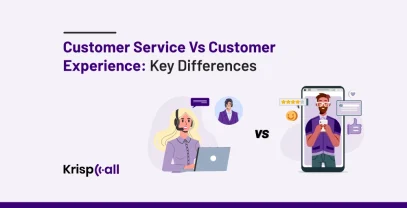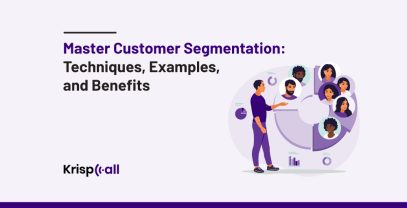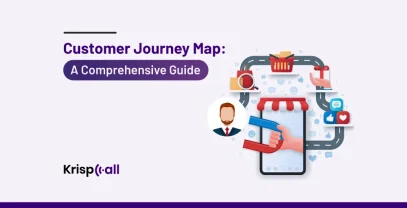Digital technology has made exceptional customer service a necessity, not a luxury. There are many companies that have difficulty managing a high volume of customer inquiries, ensuring consistent service across multiple channels, and gaining a comprehensive view of the customer’s history and preferences
It is important for businesses to have the right communication tools in order to streamline interactions, personalize communications, and maintain customer loyalty.
The Customer Relationship Management (CRM) system plays a vital role in this endeavor by automating processes, streamlining interactions, and providing deep insights into the behavior of clients.
🔥 30 Sec Summary
- Ticketing systems, omnichannel communication, integration capabilities, and self-service portals are some of the CRM features to look for in customer service.
- HubSpot is one of the popular CRM platforms for customer service due to its robust features such as ticketing systems, email tracking and automation, and document management systems.
- SugarCRM is another CRM platform designed to help businesses manage and improve client interactions with its advanced features such as omnichannel customer communications, self-service portal, and automated workflows.
- Some of the benefits of using CRM for customer service are personalized interactions, enhanced collaboration and teamwork, and improved customer satisfaction.
- Before choosing CRM for your customer service consider the things like business requirements, scalability, integration capabilities, and reporting and analytics.
What are some important CRM features to look for in customer service?
When selecting a CRM for customer service, it’s crucial to consider features that enhance efficiency, improve customer interactions, and provide valuable insights. Here are some essential features to look for:
Ticketing system
A reliable ticketing system is critical for properly addressing customer inquiries. It should make it simple to create, track, and prioritize tickets, ensuring that all the concerns are resolved as soon as possible.
Advanced features, such as automatic routing based on issue category and agent availability, can further improve processes by sending tickets to the most relevant agents, reducing response times, and increasing overall efficiency. This not only enhances customer experiences but also helps support team to as better managing their workloads, resulting in increased satisfaction and productivity.
Omnichannel communication
A CRM should contain all of the communication channels such as phone, email, chat, and other social media, allowing agents to effortlessly switch between them while maintaining a single conversation thread. This integration ensures that agents have a complete understanding of the customer’s interaction history, regardless of the communication medium used.
It also improves customer experience by ensuring consistent and efficient service, as clients are not required to repeat their complaints across multiple channels.
Integration capabilities
Before choosing a CRM service for your business, ensure it integrates with the rest of the business’s tools and systems like email marketing platforms, e-commerce systems, and social media. This integration provides a unified view of client interactions and data, allowing your team to access all relevant information from a single dashboard.
Also, integrating various systems improves workflow productivity by eliminating the need for manual data entry and lowering the chances of errors.
Self-service portal
Empower customers to find answers and resolve issues independently using the customer self-service portal that includes FAQs, troubleshooting instructions, and downloadable materials. Such a portal enables customers to access information at their convenience, decreasing the need to contact help for small reasons.
This not only improves clients’ experiences but also reduces the effort of the support team, allowing them to focus on more complicated issues.
The 7 Best CRM for Customer Service
While most CRM tools offer similar features, some of them are more suited to your needs than others.
To help you in choosing, here is a list of the top CRM for customer service by key features, limitations, and pricing.
| CRM Platform | Pricing | Features |
| HubSpot | Starts at $50/month | Ticketing systems, email tracking and automation, live chats |
| Salesforce | Starts at $25/month/user | Omnichannel routing, integration capabilities, analytics, and reporting |
| Zoho | Starts at $14/user/month | Ticket management, multichannel support, customization |
| Sugar CRM | Starts at $19/month | Self-service portal, sentiment analysis tool |
| Agile CRM | Starts at $8.99/user/month | Ticketing system, telephony integration |
| Zendesk | Starts at $55/user/month | Availability of reporting tools, scalability, and integrations |
| Freshdesk | Starts at $15/user/month | AI-powered automation, omnichannel support |
1. HubSpot
HubSpot is a CRM software that integrates marketing, sales, content management, and customer service in a single platform. It provides a suite of tools to help businesses attract visitors and convert leads.
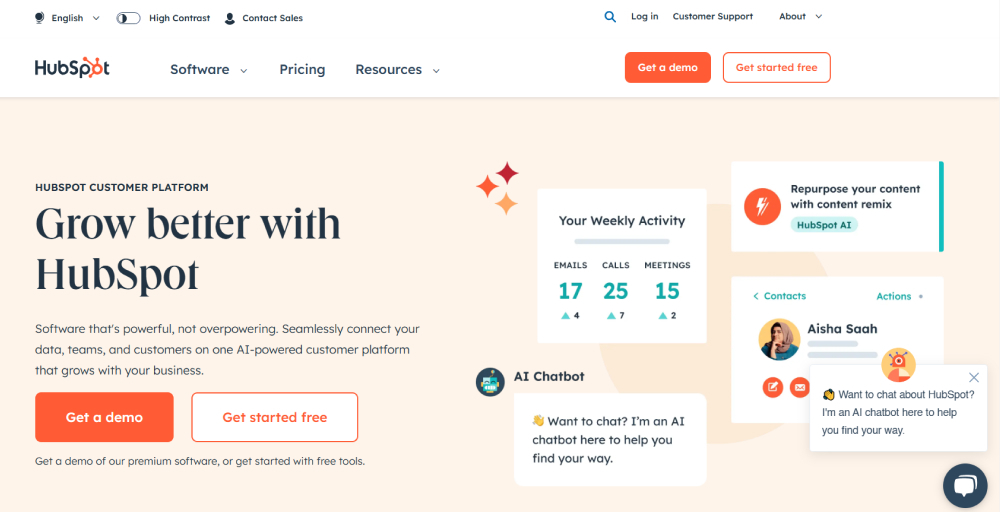
It also offers CRM services enabling businesses to manage and analyze customer interactions and data across the customer lifecycle. It is known for its easy-to-use interface and robust integration options, widely used by businesses of all sizes to boost marketing tactics, optimize sales processes, and improve customer service.
HubSpot’s key features for customer service
- Integration capabilities
- Ticketing systems
- Live chats and Chatbots
- Email tracking and Automation
- Reporting and Analytics
- Customer knowledge base
- Document management system
❎ HubSpot’s Limitations
- Expensive compared to other competitors
- Limited Customization
- Additional costs for additional technical support
💰 HubSpot’s Pricing
| Starter | Professional | Enterprise |
| $50/month | $1780/month | $5000/month |
2. Salesforce
Salesforce is a cloud-based CRM software that assists businesses with sales, marketing, customer support, and other key operations. It provides a comprehensive suite of apps and tools aimed at improving customer engagement, streamlining processes, and driving business growth.
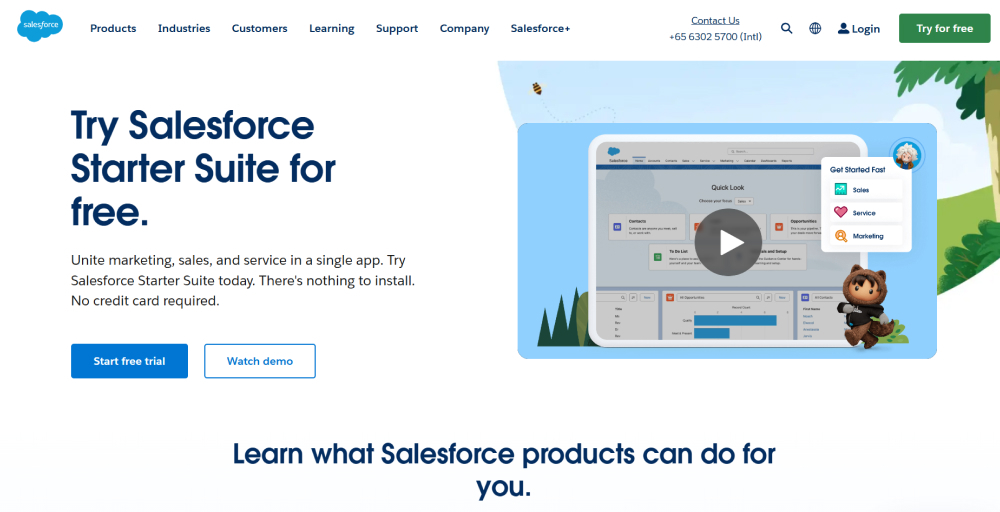
It provides sales automation, customer care, marketing automation, and artificial intelligence capabilities, enabling businesses to connect with a variety of third-party apps ensuring a seamless flow of data across different systems.
Salesforce’s key features for customer service
- Omnichannel routing
- Case management
- Unified customer view
- Live agent chat
- Integration capabilities
- AI-powered chatbots
- Analytics and Reporting
❎ Salesforce’s Limitations
- Implementation complexity
- Performance issues
- Data migration challenges
- Data storage limits
- Limited reporting on free tires
💰 Saslesforce’s Pricing
| Starter | Professional | Enterprise | Unlimited | Einstein 1 Sales |
| $25/month/user | $80/month/user | $165/month/user | $330/month/user | $500/month/user |
3. Zoho Desk
Zoho, known for its CRM platform is designed to streamline business processes across various functions such as sales, marketing, finance, and customer service. Known for its affordability and versatility, it offers a variety of tools to meet the needs of small and medium-sized enterprises, including Zoho CRM, Zoho Desks, and Zoho Projects.
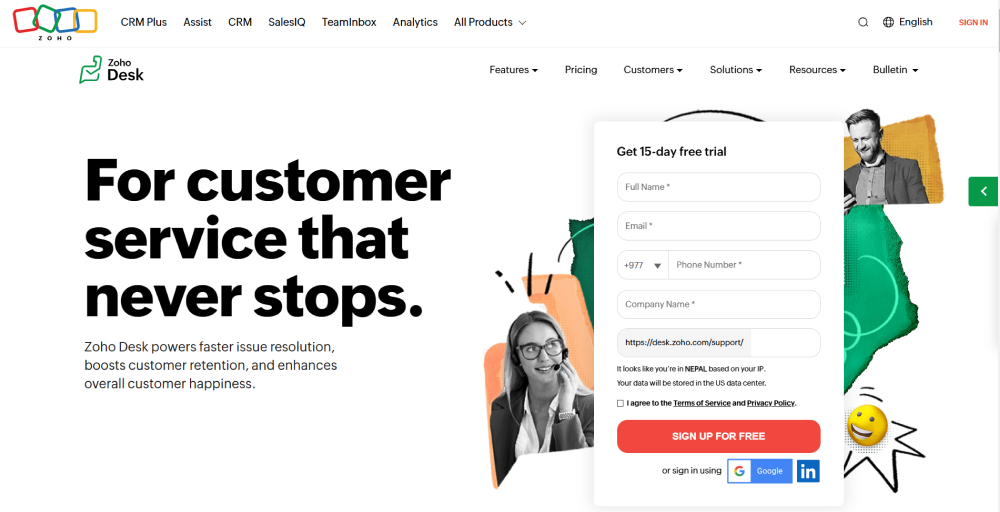
Its user-friendly interface, vast customization options, and robust integration capabilities help businesses boost efficiency, increase customer engagement, and drive growth. Also, it places a high value on data security and privacy, ensuring that business and customer data are well-protected.
Zoho’s key features for customer service
- Ticket management
- Multichannel support
- AI-powered support
- Self-service portal
- Reporting and Analytics
- Customization
- Security and Data Privacy
❎ Zoho’s Limitations
- Customization limits
- Limited reporting on lower pricing
- Integration challenges
- Complex workflows
- Limited offline access
- Additional costs for advanced features
💰 Zoho’s Pricing
| Standard | Professional | Enterprise |
| $14/user/month | $23/user/month | $40/user/month |
4. Sugar CRM
Sugar CRM is a versatile customer relationship management platform designed to help businesses manage and improve client interactions across various departments like sales, marketing, and customer services. Known for its flexibility and various customization possibilities, it allows businesses to adjust the platform to their individual needs, resulting in a more personalized experience for both employees and customers.
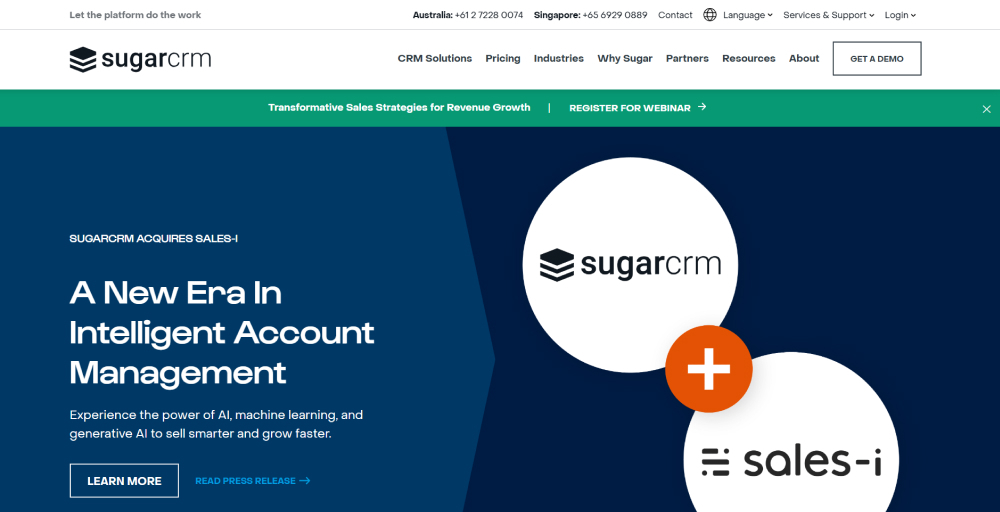
It offers sales automation, marketing campaign management, customer service, and strong analytics that provide valuable insights into customer behavior and business success. For organizations seeking to improve their customer relationships and drive growth, SugarCRM strongly focuses on ease of use and data security.
Sugar CRM’s key features for customer service
- Omnichannel customer communications
- Self-service portal
- Sentiment analysis tools
- Predictive insights and reporting
- Automated workflows
❎ Sugar CRM’s Limitations
- Limited mobile functionality
- Expensive compared to other platforms
- Customization limits
- Limited reporting on the free version
💰 Sugar CRM’s Pricing
| Essentials | Advanced | Premier |
| $19/user/month (billed annually) 3 users minimum, 5 users maximum | $85/user/month (billed annually) 3 users minimum | $135/user/month (billed annually) 10 users minimum |
5. Agile CRM
Agile CRM is a customer relationship management platform that automates sales, marketing, and customer service activities for businesses of all sizes. Its powerful analytics and reporting tools offer significant insights into customer behavior and campaign performance, allowing businesses to make data-driven decisions and enhance their strategies.
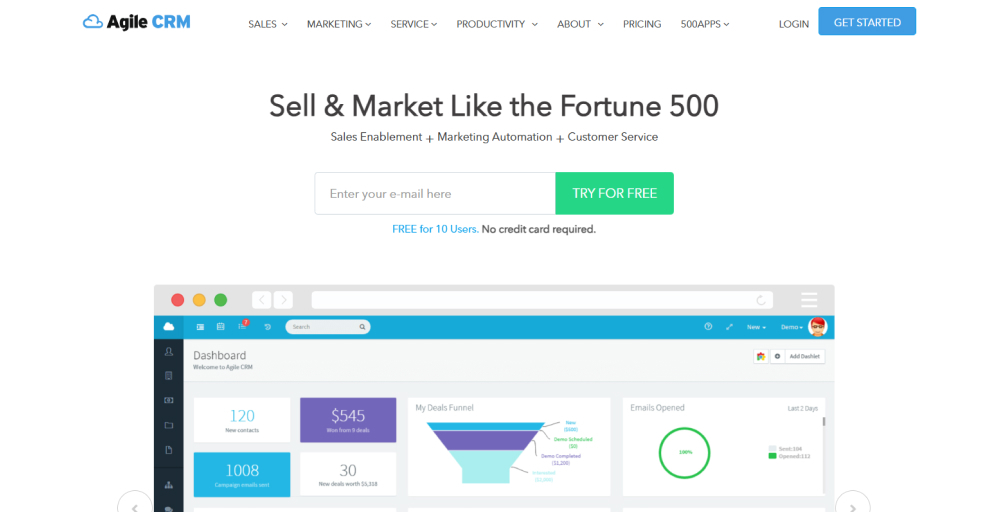
A user-friendly interface and a broad set of features make Agile CRM ideal for automating repetitive tasks, nurturing leads, and communicating with clients. It is a popular choice among businesses aiming to enhance productivity, promote growth, and provide excellent customer experiences.
Agile CRM’s key features for customer service
- Ticketing system
- Multi-channel support
- Self-service portal
- Telephony integration
- Appointment scheduling
- Automation features
- Reporting and analytics
❎ Agile CRM’s Limitations
- Limited customization
- Live chat support is unavailable
- Limited reporting options
- Scalability problem
💰 Agile CRM’s Pricing
| Starter | Regular | Enterprise |
| $8.99/user/month | $29.99/user/month | $47.99/user/month |
6. Zendesk
Zendesk is a customer service software platform that allows organizations of all sizes to manage customer interactions across various channels. Its API allows businesses to explore ways to get customer data that help in a smoother and more personalized experience.
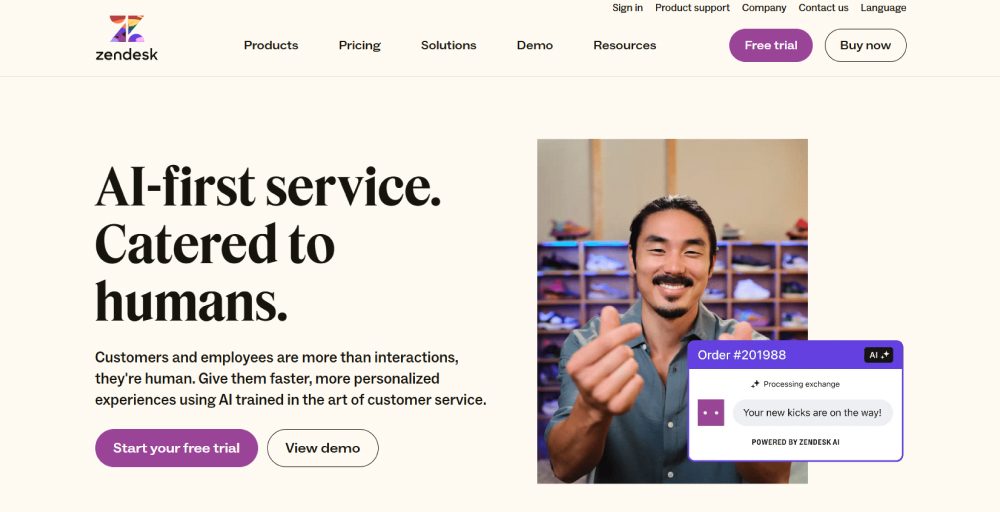
Its flexible pricing plans and scalable solutions make Zendesk a popular choice for businesses seeking to streamline their customer service operations.
Zendesk’s key features for customer service
- Availability of data reporting tool
- Platform customization
- Ticket management
- Omnichannel support
- Self-service portal
- Scalability and integration
❎ Zendesk’s Limitations
- Complex to set up and use for new users
- Integration challenges
- Inconsistent customer support
💰 Zendesk’s Pricing
| Suite Team | Suite Growth | Suite Professionals | Suite Enterprise |
| $55/agent/month | $89/agent/month | $115/agent/month | Contact Sales |
7. Freshdesk
Freshdesk is a cloud-based customer service platform that enables businesses to manage customer inquiries, support tickets, and interactions. It streamlines customer support operations and enhances the overall customer experience.
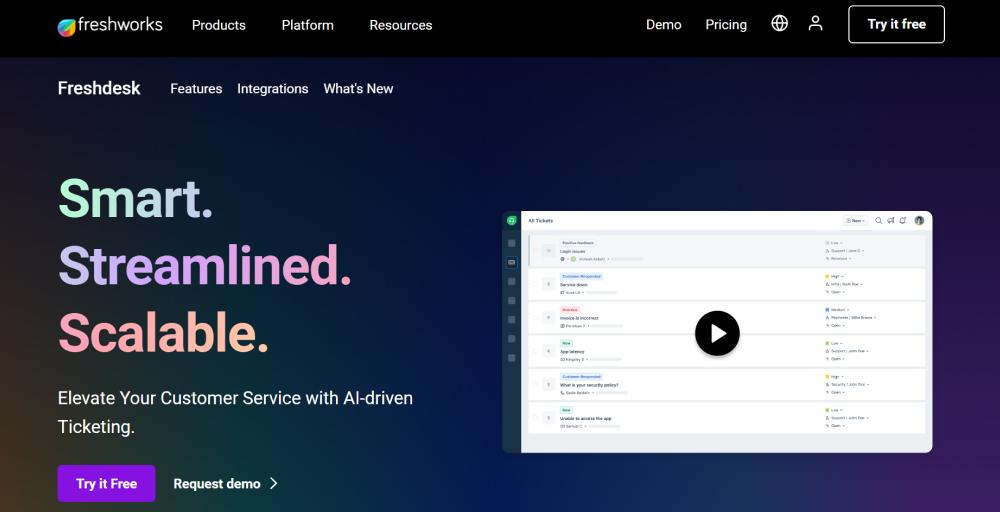
Integrating with third-party applications, such as CRM systems, project management tools, and e-commerce platforms, boosts its functionality and allows for easier workflow. Businesses can use Freshdesk’s intuitive interface and customizable workflows to manage, prioritize, and respond to customer inquiries.
Freshdesk’s key features for customer service
- Ticket management
- Omnichannel support
- AI-powered Automation
- Analytics and Reporting
- Team collaboration tools
- Sentiment Analysis
❎ Freshdesk’s Limitations
- Additional costs for advanced features
- Lack of customization
- Limited third-party integrations
- Scalability considerations
💰 Freshdesk’s Pricing
| Growth | Pro | Enterprise |
| $15/user/month (billed annually) | $49/user/month (billed annually) | $79/user/month (billed annually) |
What are the benefits of using CRM for customer service?
CRM revolutionizes customer support by providing personalized interactions, streamlining support processes, and leveraging data analytics to improve overall customer satisfaction.
CRMs can provide numerous benefits for customer service departments that can enhance their ability to provide outstanding customer service. Here are some key benefits:
- Personalized customer interactions: CRMs offer agents a 360-degree view of each customer, allowing them to personalize interactions and understand their needs. Having access to previous encounters and purchases enables agents to modify their communication style and provide more relevant answers, resulting in a better client experience.
- Enhanced collaboration and teamwork: CRMs improve collaboration among customer service teams. Using internal notes, shared ticket ownership, and collision detection features, all agents remain on the same page and prevent duplication of effort. This improves communication and results in faster issue resolution.
- Improved customer satisfaction: CRMs greatly increase customer satisfaction by offering faster resolution times, tailored interactions, and a self-service gateway for simple inquiries. Furthermore, some CRMs provide tools such as sentiment analysis to help identify client sentiments and tailor communication accordingly, thereby improving the overall customer experience.
- Data-driven decision-making: CRMs offer valuable insights via reporting and analytics. Track key indicators such as resolution time, customer satisfaction, and agent performance and prepare reports to discover the areas of improvement, understand customer trends, and make data-driven decision-making.
Things to consider before choosing CRM for customer service
Before choosing a CRM (Customer Relationship Management) system for customer service, it’s essential to consider several factors to ensure that the chosen solution meets your business needs and objectives effectively. Here are some key things to consider:
- Business requirement: Identify your unique business needs and objectives before implementing a CRM system for customer service. Consider various factors like customer base size, the complexity of your sales and support operations, and the outcomes you want for your customer service improvement.
- Scalability: Choose a CRM system that can scale with your business as it grows. Ensure that the chosen solution can handle an increasing number of users, data volume, and customer interactions without affecting performance or usability.
- Integration capabilities: Consider how the CRMs integrate with other business tools and systems such as email marketing platforms, e-commerce systems, and helpdesk software. Choose CRMs that integrate seamlessly with existing technologies to ensure data consistency and workflow efficiency.
- User-friendliness: Evaluate the CRM platforms’ usability and ease of use, particularly for the frontline service agents and other end users who will engage with it daily. Select a CRM with a simple interface, straightforward navigation, and comprehensive training resources to assist user adoption.
- Analytics and Reporting: Examine the CRM analytics and reporting capabilities to ensure they give insights into customer interactions, service performance, and trends. Look for features like customizable dashboards, pre-built reports, and powerful analytics tools to help you make data-driven decisions and achieve continuous improvement.
Wrapping Up!
Whether you are a small business or a major corporation, there’s a CRM system tailored to meet your specific needs and will help you reach your customer service objectives.
By carefully analyzing your unique requirements and evaluating the strengths and limitations of each CRM software platform, you make a wise decision. With the correct CRMs, customer satisfaction can increase, workflows can be streamlined, and interactions can be made more personalized.



